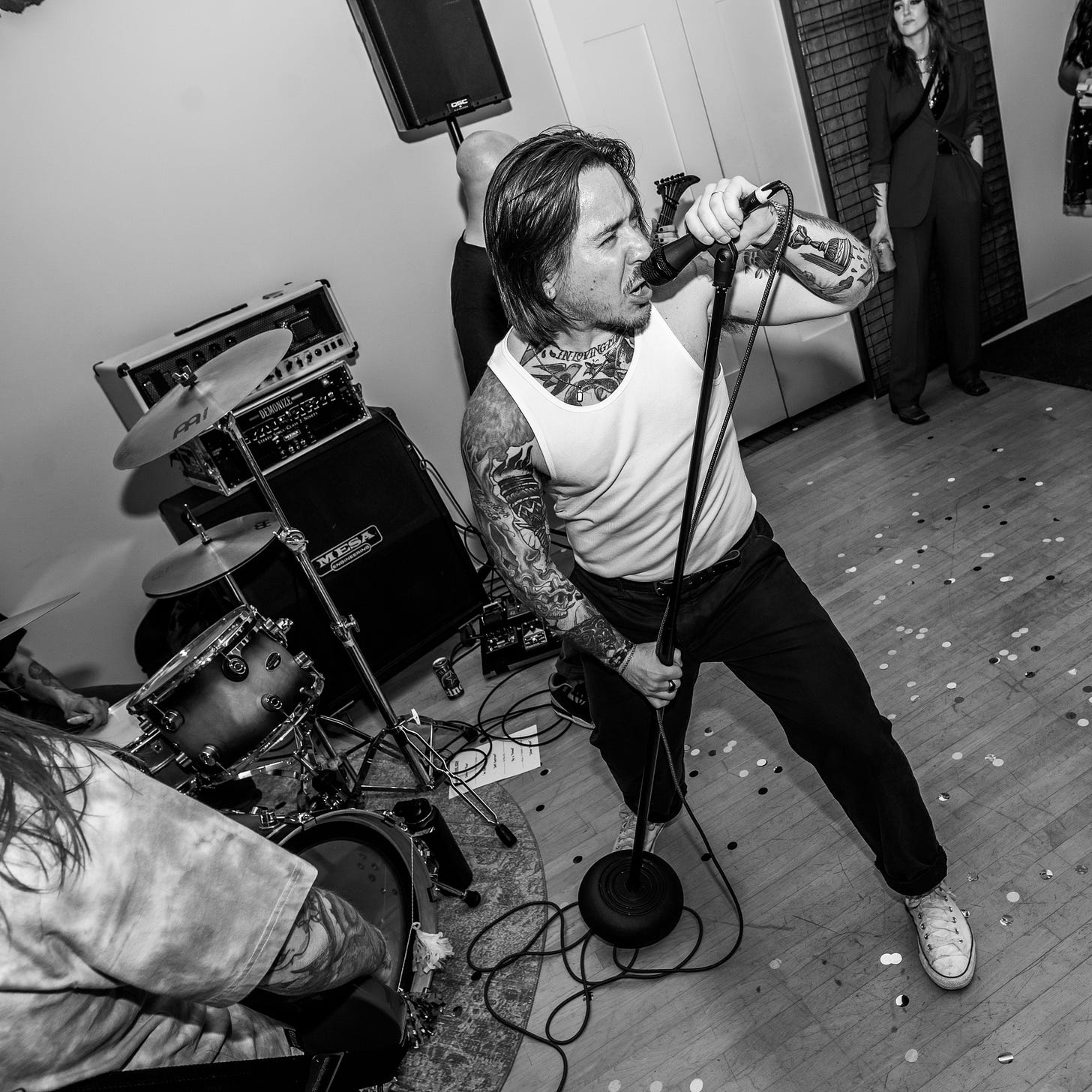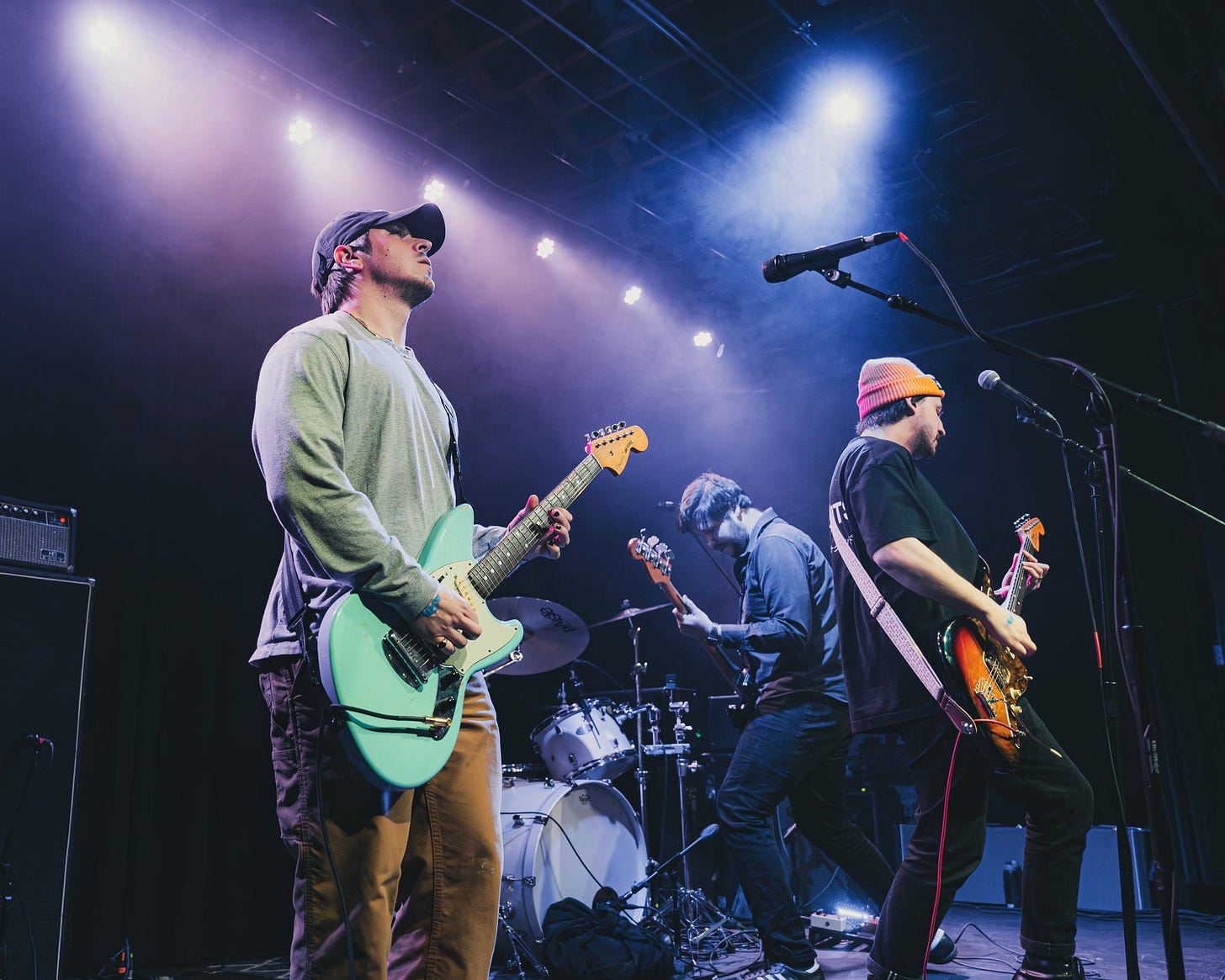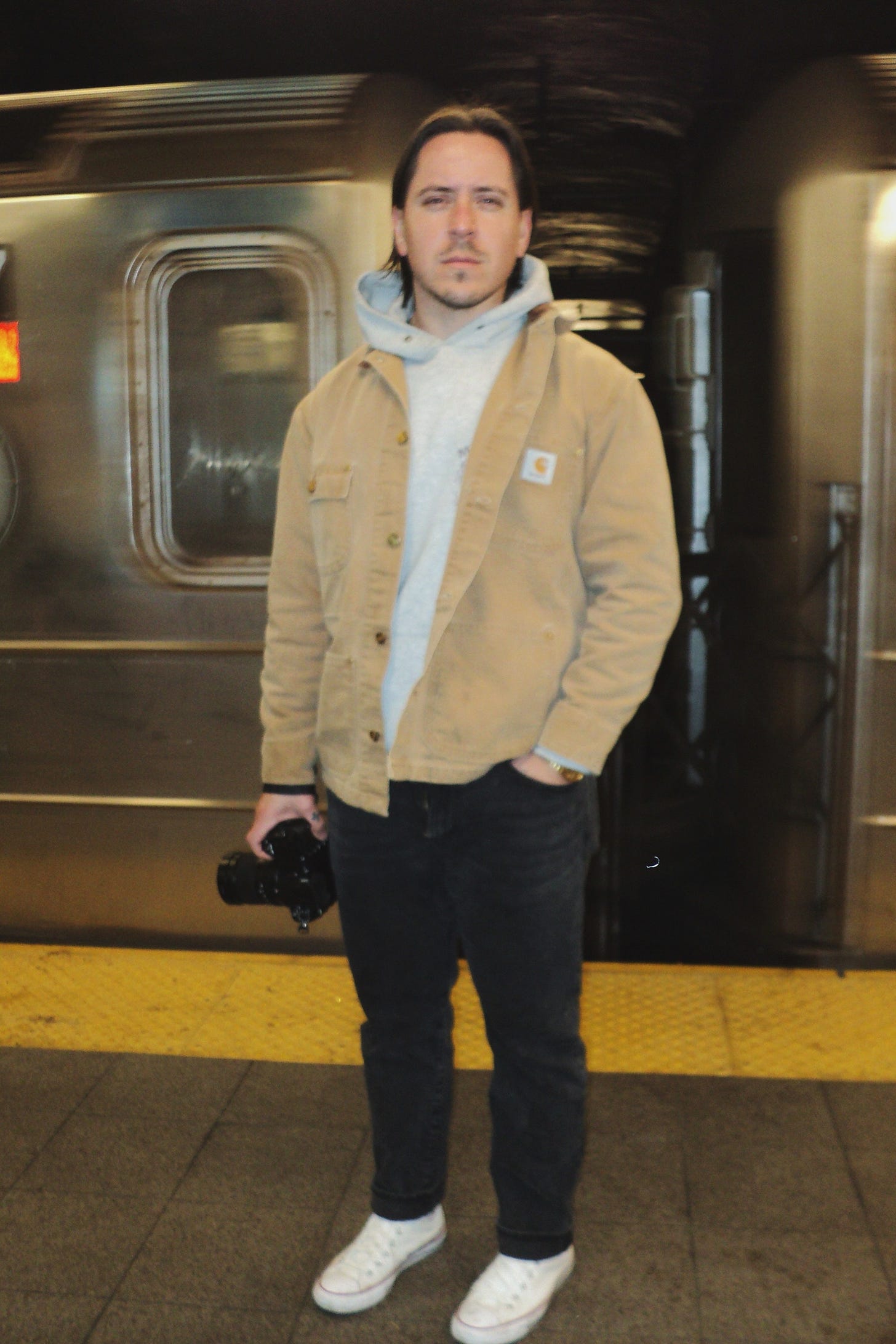Under the Influence: Damon Weinhold of Old Suns, Demonize, & Super Reg
The ever-busy musician opens up on his early favorite records, Stretch Arm Strong, and the absurdity of being in three bands in your thirties...
When you think back on your childhood, what music or art were you exposed to that you can say shaped your tastes as you grew up? Were there any musicians in your family that inspired or encouraged you?
In the truest sense of the word, my mom has an eclectic taste in music. In 1997, we left Maine for South Carolina in a rusty Honda Civic hatchback following a particularly icy winter. We spent something like two weeks without heat or power. I distinctly remember the playlist venturing from Matchbox Twenty and Blackstreet to Dolly Parton and Alice In Chains on the drive toward warmer weather.
My mom had me when she was 19 and raised me by herself. She has, in many ways, always refused to be bound by genre. I’ve idolized her for that, too, which I imagine is a near-universal experience for children of single parents. Looking back, it’s only fitting that my interests have grown equally assorted.
What I mean to say is that the music I’ve liked has always been more about a feeling than a particular sound. And I’ve carried that theme into playing as well: pursue everything. I suppose I’m a bit of a “jack-of-all-trades” musician for that reason.
How old were you when you first started to gravitate towards the world of "rock" music or guitar-based genres? What were some of the bands that you remember first finding on your own or from your peers?
Like most people of a certain age, Metallica’s Black Album is structurally integral to my personality. Every time I hear “Wherever I May Roam,” it hits me just as hard as it did the first time. That record came out one year before I was born and, thankfully, I’ve never had to bear the pain of a world without it. (Well earned) Lars criticism aside, it’s perfect to me. It is the rock in the pond from which all other music in my life ripples outward.
Linkin Park was the first band I dove headfirst into on my own. I somehow acquired a copy of Hybrid Theory in the wake of the radio success they found with “In the End,” and my friend Hayden and I wore it out over the course of fifth grade. It was raw, innovative, and melodic. It didn’t fit perfectly into a box. I still think it stands up.
Around seventh grade, I discovered the bands that would lay the foundation for the first songs I’d later attempt to write. In the virus-infested waters of LimeWire, I stumbled upon Underoath’s They’re Only Chasing Safety and Atreyu’s The Curse. There was screaming and singing, breakdowns and pinch harmonics, double kick and big choruses – what more could an angsty preteen ask for?
Do you remember your first show, either a local or a bigger act?
My uncle, Scott, is a professional jazz saxophonist. He introduced me to the early greats, like Parker and Coltrane, long before I could truly appreciate them. Because of him, I joined the middle school band, took it far too seriously, and defended my title as “First Chair” semester after semester. I was…that kid.
Indelible in my memory is one night and two very different concerts. My uncle first took me to see Chris Potter at the Koger Center for the Arts. At the time, it was the premier performing arts theater in Columbia, South Carolina. Columbia certainly isn’t a jazz mecca by any stretch of the imagination, but I’d never experienced live music – it might as well have been Madison Square Garden.
I remember it being packed. The room itself is huge, and Potter’s saxophone filled every square inch. I hung on each note. At the end of the performance, my uncle bought a CD and had Chris sign it for me. I was in heaven.
Afterward, we made our way to a seafood restaurant and bar called The Blue Marlin. I have to imagine it was sometime past 10 pm, so it had long since become more bar than restaurant. That’s where I witnessed my first true act of magic, my uncle transforming into a musician right before my eyes. He uncased his saxophone, placed fingers to keys and lips to mouthpiece, and I watched the lines blur between person and instrument.
Looking back, I think there’s something transcendent about watching someone you know do something you think is impossible. Just an hour or so before, I watched someone who seemed famous do what famous musicians do – sell out a theater and perform. It was incredible, of course, but it was expected. There I was watching someone I loved do the same thing, albeit for a much smaller crowd (that night, anyway). It unlocked a world of possibility for me.
I certainly don’t consider myself a musician of any comparable caliber, but I think I’ve been chasing a transcendent experience like that ever since.
We all have had experiences surrounding formative shows. Is there a show that you can reflect on as being a pivotal moment in your life?
The best part about growing up in a small city like Columbia is that the musicians who’ve “made it” occupy this liminal space between actual fame and relative obscurity. They’re within reach, figuratively and literally, but decidedly not like you and your friends. I was lucky enough to grow up in a time and space that overlapped with Stretch Arm Strong.
Stretch Arm Strong, for the uninitiated, stands as Columbia’s response to ‘90s hardcore. They’re equal parts punk and melodic, and local anthems like “For the Record” were about us. In hindsight, it shouldn’t be a surprise that seeing Stretch Arm Strong on their home turf at New Brookland Tavern would transform my relationship with music – but it did.
It was supremely loud and chaotic. People tried to pry the microphone from the singer’s hands. The crowd dove off the stage, pushed each other around the room, sang in unison, and hugged one another as the set came to a close. The scowls behind the riffs turned quickly into smiles as guitars came unplugged. But these musicians didn’t disappear into a green room like I’d grown accustomed to. They filtered out across the venue. They sat at the bar. They were just, well, people.
I was barely a teenager, but it was nothing short of profound for me. All of your favorite artists are someone else’s local bands. Years later I would shadow Stretch Arm Strong singer, Chris McLane, for a school project. He introduced me to veggie burgers, helped me get on a show with Hawthorne Heights, and was wildly generous with his time. I remain inspired by Stretch – and by Chris – to this day.
When did you decide to try playing music yourself for the first time? What was your first band or writing experience like?
I began dreaming about starting a band the moment Hayden and I picked up Hybrid Theory. Neither of us knew how to play instruments at the time, but we had a band name (Loser Denial), a hand-drawn logo, and a litany of titles for to-be-written songs.
Then, in the shadow of Fall Out Boy’s 2005 masterpiece, From Under the Cork Tree, my uncle sent me a navy blue Squier Stratocaster and a plastic Walmart bag full of distortion pedals. I’ve never fancied myself to be a spiritual person, but this was about as much of a sign as I needed to dive in. I had a guitar and access to a dial-up internet connection. The world was my oyster.
After months of learning from my sage advisor, Ultimate-Guitar.com, I was armed with power chords and a rudimentary understanding of song structure (intro > verse > chorus > verse > chorus > bridge). Hayden started playing guitar months earlier, and had since started a band with kids from his neighborhood: Yesterday’s Tomorrow (thought-provoking at the time, and out of respect for not stealing our shared band name). One thing led to another and I auditioned to join. Apparently, whichever rendition of “Sugar, We’re Goin Down” I certainly played was impressive enough to earn my spot on their JV roster.
Whether our band was actually “good” aside – and it absolutely was not good in any conventional sense of the word – it gave us artistic freedom and the agency to create. We wrote our own songs. We performed at birthday parties and in backyards. We broke up, we formed new bands, we forged new friendships, and we grew into new expressions of music.
As I’ve aged, so much about music and the world in which we create it has evolved. The feeling of writing music with people you love and sharing it with the world, however, has not. To consume music is an escape, but to create it feels like a responsibility. One of my favorite writers, Toni Morrison, once said, “If there's a book that you want to read, but it hasn't been written yet, then you must write it.” Musicians carry that same responsibility when it comes to songs.
I love hearing that you started out on a Stratocaster because I don't think I've ever seen you play any guitars other than Fender over the past few years. How do you look at your instruments and gear as part of the creative process? Do you search out instruments and effects that replicate a sound in your head or is it more of the sound of your equipment leading you as a songwriter type of scenario?
Music is an inherently aesthetic endeavor. Whereas painters use brushes, palettes, and mediums to communicate concepts or feelings, musicians choose guitars, amps, and pedals. The processes are different, but the idea remains the same.
I've played and owned a number of different brands of guitars, all of which had an aesthetic application, but coming back to Fender felt like home. They're comfortable. They also serve as really great platforms for customization and rugged use. Lately, I've been drawn by the simple sophistication of the original Jag-Stangs. One humbucker, a single-coil pickup, a short-scale neck, and very few frills.
Anyone who tells you they aren't influenced by the gear their idols use (or used) is a liar. But you should always seek to uncover the "why." In that answer, you begin to understand how to create the sounds you're chasing. For me, the gear I choose is a means to construct and communicate those aesthetics – not wholly dissimilar to choosing a destination and then deciding the best route (or in my case, the most obscene pedal chain) to get there.
The first thing that comes to mind for me when I think of Old Suns is the balance of melodic catchiness and overwhelming volume. What is the writing process like for that band?
I am probably Old Suns’ biggest fan. I fully expect to be ridiculed for that statement, but this band represents everything I’ve dreamed of participating in since I picked up an instrument. I don’t mean to say I think Old Suns is the best band in the world – or even a good band for that matter – but it marks a milestone in all of our lives.
Aaron and I started Old Suns in the throes of the COVID pandemic, just as lockdown restrictions began to lift. We were both closing in on 30, and neither of us had been on stage in nearly a decade. We reconnected following my move to Raleigh, the city in which we met when our bands first toured together 11 years before. Aaron, then in a band that later came to be called Empire, and me, in Behold. The Messenger. Those names alone probably communicate all you need to know about the depth of our v-neck t-shirts and the swoop of our bangs.
Following a brief exchange on Instagram, Aaron shared a handful of demos he’d written since we were first ordered to “shelter in place.” I was on a serious Jimmy Eat World kick then, which I guess describes most of my adult life, and it all just clicked. We began brainstorming about sounds, gear, and other members immediately. Then, things serendipitously fell into place. I don’t want to speak for everyone, but releasing music again and getting back on stage felt like a personal triumph.
When it comes to writing, we start with a sound. It’s always been less about categorical confines and more about what excites us sonically. I guess it tracks then that we’ve modeled ourselves after the tones we’ve sought. With a sound in mind, Aaron generally brings fleshed-out demos to the table. Occasionally these are driven by riffs Halston, Colin, or I have sent to the group, but more often they’re all his from the ground up. He’s a virtuoso in his own right, though I’d much rather roast him to his face.
In the process of learning songs, Colin brings thoughtful ideas for atmosphere and rhythm, and Halston thinks about guitar and melody in a capacity few others can. He’s also not a drummer by trade, but he’s brought a fresh perspective and grown into the position in impressive measure. I’d like to think I contribute some irreplaceable glue that binds all of the compositions, but I really just add my spin to leads and modulation.
Through my eyes, Old Suns is an easy band to love. We’re all in our second acts and we’re older than most of the bands we play with. We write pop songs covered in distortion and dripping with reverb, and we’re all still finding ways to grow – personally and musically.
You recently put the guitar down to act as a frontman in Demonize. Setting aside the shift in genre from Old Suns, how is the mindset different in performing or writing for that project?
Oddly enough, the two overlap more than they differ. Both bands are trying to be the same thing: authentic. The greatest sum of their constituent parts.
Demonize is the first band I’ve fronted without a guitar in my hand. It’s daunting, of course, but I spent years dreaming of leading a heavy band. Demonize has allowed me to do that with four of the most talented and accomplished musicians I know – Andrew, Halston, Shane, and Tom. I feel a unique obligation to write meaningful lyrics, hone my vocal craft, and deliver consistent performances. The bar is high, but I think that’s the beauty of it.
It started with an idea. A band composed of riffs and heft in equal measure. Familiar enough that casual fans of metal and hardcore can headbang, but thoughtful enough that trained ears and lyrical connoisseurs can find depth. Demonize is still coming into its own, of course, but I’m confident that we’re well on our way to achieving that vision.
We’re all chasing our own versions of perfection, and losing the forest for the trees along the way. Music is messy. So is life. I think the worst thing you can do with either is lose sight of what drives you.
It seems like performing and writing has really enthralled you in the last few years since Old Suns started. You started Demonize but also recently joined Super Reg as a guitarist. Is there something about the community or the experience of it all that keeps you involved beyond the creative aspect of being in bands?
It's simple: I really, sincerely enjoy playing music.
I am not a stellar musician, nor am I particularly well-versed in theory or composition. However, I do consider myself a consistent performer. A decade off-stage reminded me of that. Super Reg is just the "blatantly blasé" icing on the "we just want to have fun" cake.
That is not to say that Super Reg doesn't put a lot of thought into songwriting or approach — Alex, Gurkin, Heath, and Matt are incredibly thoughtful musicians — but it is to say that the stated goal of the band is to live somewhere between simplicity, invention, and absurdity. It's catchy but it's surprising, it's heavy but it's not, it's ridiculous but it makes sense. Kind of like joining a third band in your 30s when that band happens to be Super Reg.
Ultimately, Raleigh is my home. I've never been more proud to be part of a music scene than I am today, and the scene is comprised of genuinely good, talented, and caring people from an array of backgrounds and experiences. I'm excited – and hopeful - to watch it evolve and expand over the coming years.







